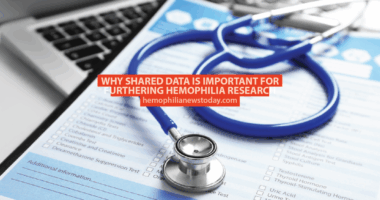Staff cuts at the Division of Blood Disorders threaten our community
4 columnists combine their voices in a statement of protest and concern

Note: All four U.S.-based columnists for Hemophilia News Today collaborated on this column. While readers may see individual columns on these issues in the days to come, these writers felt it was important to share their collective voice to highlight the impact of recent changes at the U.S. Centers for Disease Control and Prevention.
If only it were an April Fool’s joke.
Our community has been devastated by recent news. Because of the U.S. Health and Human Services’ reduction in force directive, almost the entire staff of the Division of Blood Disorders and Public Health Genomics at the U.S. Centers for Disease Control and Prevention (CDC) has been placed on administrative leave, with terminations expected soon, according to Phil Gattone, president and CEO of the National Bleeding Disorders Foundation.
The loss includes professionals “whose dedication has strengthened our community through vital research, public health programs, and data collection efforts,” Gattone wrote in a statement. “The landscape of public health [has] shifted in ways that deeply affect the bleeding disorders community,” he added.
The Hemophilia Federation of America (HFA) called the move a “major blow” to the bleeding disorders community that would reduce tracking of people with bleeding disorders, access to inhibitor testing, and blood supply surveillance.
“After months of watching public health programs get restructured like someone rearranging furniture in the dark, the latest shake-up has landed squarely on our doorstep,” Coalition for Hemophilia B CEO Kim Phelan wrote.
As Hemophilia News Today columnists in the U.S., our lives have been safer because of the CDC’s Division of Blood Disorders and Public Health Genomics. The specialized access it offers to inhibitor testing plays a key role in inhibitor diagnosis. All hemophilia treatment centers participating in the Community Counts surveillance data program could access this testing for patients.
In the past, we in the bleeding disorders community were devastated by the contamination of the U.S. blood supply with HIV and hepatitis. But that’s changed, thanks in part to the CDC. As the HFA reminds us, “The CDC ensures safety of the bleeding disorders community by monitoring emerging blood-borne pathogens in the national blood supply such as HIV, hepatitis, and more recently, the Zika and Ebola viruses.”
In the 1980s, 90% of people with severe hemophilia in the U.S. were infected with HIV because tests to detect it didn’t exist or weren’t widespread. Many died as a result. In response, our community made a strong vow: “never again.” The Division of Blood Disorders and Public Health Genomics played a significant role in making that vow the truth. We cannot afford to lose this protection.
The four of us are deeply concerned for our community in the wake of this recent news. Our life experiences and perspectives may help others understand the potential scope of the devastation.
Cazandra Campos-MacDonald and Joe MacDonald
In 2006, our youngest son was diagnosed with severe hemophilia A with a high-titer inhibitor. We discovered, through testing, that he was allergic to factor VIII. At the time we started treatment, there were only two known cases of our son’s unique complication.
Our deep concern is that reducing the Community Counts data collection staff risks losing accurate records of complications such as inhibitors, product allergies, and the long-lasting effects of joint damage related to rare subgroups of bleeding disorders. This reduction will compromise the quality of care for patients like our son who have these exceptionally rare conditions.
(Cazandra’s column is “Hemophilia 24/7,” and her husband Joe’s is “In the Twinkling of an Eye.”)
Jennifer Lynne
I was 20 years old when I received a letter from my hemophilia treatment center that shook me to my core. It said I was considered a high risk for HIV infection because of medication I’d received to treat my bleeding disorders during knee surgeries.
I was terrified. That period of uncertainty and fear is something I’ll never forget — and it should never happen again.
But with the recent reduction of CDC staffing and funding for bleeding disorder surveillance and blood safety, we risk repeating history. These programs are essential to protecting lives and ensuring that what happened to my generation doesn’t happen to the next one.
We must speak up. We must protect our community. We cannot afford to be silent.
(Jennifer’s column is “Hemophilia and Me.”)
G Shellye Horowitz
When I was in the ninth grade, my parents sat me and my siblings down and said, “Your dad got HIV from his hemophilia medication and won’t live long. You cannot tell anyone, or they may kick you out of school.”
In the ’80s, people were scared about HIV transmission and wanted to quarantine people with the virus. Other blood-borne pathogens will emerge in the future. Surveillance is critical for early detection to keep us safe.
Additionally, I’ve personally used CDC inhibitor testing. My hemophilia medications don’t always work as expected. Specialized testing to better understand this issue is a unique and necessary service provided by the CDC.
Finally, the Community Counts surveillance data program means a lot to me. We’ve seen the number of women treated at hemophilia treatment centers grow steadily as they access proper diagnosis and care. If the surveillance ceases, we lose the opportunity to track important progress like this.
The American Society for Hematology issued a statement April 8 that shared the concerns of over 90 organizations serving patients with bleeding disorders. We need our collective voice to speak out and ensure that our safety is maintained moving forward.
As the NBDF’s Gattone noted, “We will need your voices, your advocacy, your participation, and your leadership to ensure that the vital programs serving the bleeding disorders community remain strong. This is not a time to remain on the sidelines.”
Note: Hemophilia News Today is strictly a news and information website about the disease. It does not provide medical advice, diagnosis, or treatment. This content is not intended to be a substitute for professional medical advice, diagnosis, or treatment. Always seek the advice of your physician or another qualified health provider with any questions you may have regarding a medical condition. Never disregard professional medical advice or delay in seeking it because of something you have read on this website. The opinions expressed in this column are not those of Hemophilia News Today or its parent company, Bionews, and are intended to spark discussion about issues pertaining to hemophilia.








Susan Swindle
Great Article.
Thank you.
G Shellye Horowitz
Thank you!